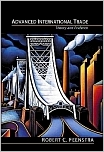| |||||
• polskie
• Zamów informacje o nowościach z wybranego tematu • kontakt |
ADVANCED INTERNATIONAL TRADEFEENSTRA R.wydawnictwo: PRINCETON, 2004, wydanie Icena netto: Advanced International Trade is the first major graduate textbook in international trade in a generation. Trade is a cornerstone concept in economics, taught in all departments both in the United States and abroad. The past twenty years have seen a number of new theoretical approaches that are essential to any graduate international trade course, and will be of interest in development economics and other fields. Here, Robert Feenstra steps beyond theory to consider empirical evidence as well. He covers all the basic material including the Ricardian and Hecksher-Ohlin models, extension to many goods and factors, and the role of tariffs, quotas, and other trade policies; recent material including imperfect competition, outsourcing, political economy, multinationals, and endogenous growth; and new material including the gravity equation and the organization of the firm in international trade. Throughout the book, special emphasis is placed on integrating the theoretical models with empirical evidence, and this is supplemented by theoretical and empirical exercises that appear with each chapter. Advanced International Trade is intended to bring readers to the forefront of knowledge in international trade and prepare them to undertake their own research. Both graduate students and faculty will find a wealth of topics that have previously only been covered in journal articles, and are dealt with here in a common and simple notation. In addition to known results, the book includes some particularly important unpublished results by various authors. Two appendices describe empirical methods applicable to research problems in international trade, methods that draw on (i) index numbers and (ii) discrete choice models. Thoroughly up-to-date and marked by clear, straightforward prose, this book will be used widely--and enthusiastically. Professors: A supplementary Solutions Manual is available for this book. It is restricted to teachers using the text in courses. For information on how to obtain a copy, refer to: http://pup.princeton.edu/class.html Robert C. Feenstra is Professor of Economics at the University of California, Davis. A former editor of the Journal of International Economics, and currently an associate editor of that journal and the American Economic Review, he has edited eight books and published numerous articles on international trade. He also directs the International Trade and Investment research program at the National Bureau of Economic Research. Endorsements: "No other book in advanced international trade matches this one in providing a clear, complete, up-to-date, balanced, and systematic summary of international trade theory and evidence. Its impact on the graduate education and scholarly research of international trade will be felt for years to come."--Bin Xu, University of Florida "In fifteen years of teaching this material I have never used a textbook. Thanks to Robert Feenstra, my students are about to experience a dramatic change for the better. When I have a question about international trade I immediately turn to Rob Feenstra for answers and insights. He is the most distinguished empirical researcher in the field today. Not surprisingly, this book reflects both his awesome scholarship and his ability to communicate ideas simply."--Daniel Trefler, University of Toronto "This book is a tremendous contribution. It will quickly become 'the' main textbook in graduate international trade classes, and will be a useful reference for many others interested in the field. It is very up-to-date and is unique in emphasizing empirical testing and results, precisely what most trade economists are doing these days."--Douglas Irwin, Dartmouth College, author of Free Trade Under Fire "Feenstra covers his topics fabulously. I hope--for the sake of our field--that this book will help to complete a revolution already underway in turning the study of international trade from speculation into a science."--Donald Davis, Columbia University Table of Contents: Acknowledgments ix 495 pages Paperback Księgarnia nie działa. Nie odpowiadamy na pytania i nie realizujemy zamówien. Do odwolania !. |


